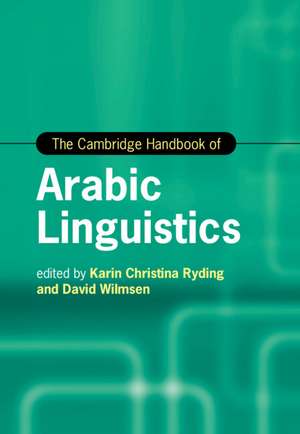The Cambridge Handbook of Arabic Linguistics: Cambridge Handbooks in Language and Linguistics
Editat de Karin Ryding, David Wilmsenen Limba Engleză Hardback – 29 sep 2021
Din seria Cambridge Handbooks in Language and Linguistics
-
 Preț: 257.36 lei
Preț: 257.36 lei -
 Preț: 418.51 lei
Preț: 418.51 lei -
 Preț: 282.02 lei
Preț: 282.02 lei - 14%
 Preț: 989.26 lei
Preț: 989.26 lei -
 Preț: 282.53 lei
Preț: 282.53 lei -
 Preț: 285.18 lei
Preț: 285.18 lei -
 Preț: 280.50 lei
Preț: 280.50 lei -
 Preț: 338.63 lei
Preț: 338.63 lei -
 Preț: 297.50 lei
Preț: 297.50 lei -
 Preț: 281.54 lei
Preț: 281.54 lei -
 Preț: 280.68 lei
Preț: 280.68 lei -
 Preț: 347.32 lei
Preț: 347.32 lei -
 Preț: 423.15 lei
Preț: 423.15 lei -
 Preț: 286.28 lei
Preț: 286.28 lei -
 Preț: 283.58 lei
Preț: 283.58 lei -
 Preț: 417.89 lei
Preț: 417.89 lei - 14%
 Preț: 880.31 lei
Preț: 880.31 lei -
 Preț: 419.22 lei
Preț: 419.22 lei -
 Preț: 315.13 lei
Preț: 315.13 lei -
 Preț: 284.81 lei
Preț: 284.81 lei - 19%
 Preț: 501.32 lei
Preț: 501.32 lei - 23%
 Preț: 1493.38 lei
Preț: 1493.38 lei -
 Preț: 419.93 lei
Preț: 419.93 lei - 19%
 Preț: 451.06 lei
Preț: 451.06 lei - 23%
 Preț: 949.76 lei
Preț: 949.76 lei - 23%
 Preț: 1066.00 lei
Preț: 1066.00 lei - 14%
 Preț: 989.04 lei
Preț: 989.04 lei -
 Preț: 370.92 lei
Preț: 370.92 lei - 23%
 Preț: 1075.01 lei
Preț: 1075.01 lei - 23%
 Preț: 1023.97 lei
Preț: 1023.97 lei - 11%
 Preț: 507.18 lei
Preț: 507.18 lei - 23%
 Preț: 753.13 lei
Preț: 753.13 lei -
 Preț: 473.75 lei
Preț: 473.75 lei -
 Preț: 468.73 lei
Preț: 468.73 lei - 23%
 Preț: 1027.19 lei
Preț: 1027.19 lei
Preț: 977.84 lei
Preț vechi: 1269.93 lei
-23% Nou
Puncte Express: 1467
Preț estimativ în valută:
187.16€ • 194.65$ • 156.84£
187.16€ • 194.65$ • 156.84£
Carte disponibilă
Livrare economică 20 februarie-06 martie
Preluare comenzi: 021 569.72.76
Specificații
ISBN-13: 9781108417303
ISBN-10: 1108417302
Pagini: 650
Dimensiuni: 177 x 251 x 40 mm
Greutate: 1.23 kg
Editura: Cambridge University Press
Colecția Cambridge University Press
Seria Cambridge Handbooks in Language and Linguistics
Locul publicării:Cambridge, United Kingdom
ISBN-10: 1108417302
Pagini: 650
Dimensiuni: 177 x 251 x 40 mm
Greutate: 1.23 kg
Editura: Cambridge University Press
Colecția Cambridge University Press
Seria Cambridge Handbooks in Language and Linguistics
Locul publicării:Cambridge, United Kingdom
Cuprins
Introduction and Chapter Summaries Karin Ryding and David Wilmsen; Part I. Arabic Applied Linguistics: 1. Arabic Applied Linguistics Mohammad Alhawary; 2. Language Planning in the Arab World Hussein Elkhafaifi; 3. The Study of Arabic Language Acquisition Karen Froud and Reem Khamis-Dakwar; 4. Issues in Arabic Language Testing and Assessment Michael Raish; 5. Arabic Study Abroad: Critical Contextualization and Research-based Interventions Emma Trentman; 6. Models of Arabic Pronunciation Kassem Wahba; Part II. Arabic Variation and Sociolinguistics: 7. Diglossia, Variation, and Structural Complexity Samira Farwaneh; 8. Sociolinguistic Variation and Variation in Sociolinguistics Uri Horesh; 9. What is Formal Spoken Arabic? Gunvor Mejdell; 10. Arabic Dialectology Stephan Procházka; 11. Maltese: A Peripheral Dialect in the Historical Dialectology of Arabic David Wilmsen; Part III. Theoretical and Descriptive Studies: 12. Grammaticalization in Arabic Mohssen Esseesy; 13. Arabic and Onomastics Terrence Potter; 14. The Intonation of Arabic Khaled Rifaat; 15. Case in Arabic Karin Ryding; 16. On Arabic Morphosyntax within the Theory of Generative Grammar Usama Soltan; 17. Arabic Morphology: Inflectional and Derivational Janet Watson; Part IV. Arabic Computational and Corpus Linguistics: 18. Arabic Computational Linguistics Nizar Habash; 19. Arabic Corpus Linguistics and Related Tools: An Overview and Some Critical Observations Mark Van Mol; 20. The Utility of Arabic Corpus Linguistics Mai Zaki, David Wilmsen and Dana Abdulrahim; Part V. Arabic Linguistics and New Media Studies: 21. Language Policy and the Arabic Localization of Twitter Amy Johnson; 22. Variation and Social Change on Syrian Dissidents' Social Media Francesco Sinatora; Part VI. Arabic Linguistics in Literature and Translation: 23. Vernacular Varieties in Recent Arabic Literature Eva Håland; 24. Stylistics and Translation: A Corpus-based Case Study of English-Arabic Demonstratives Mai Zaki.
Recenzii
'Edited by two distinguished scholars of Arabic, this Handbook is a welcome, critical introduction to one of the largest and most important languages of the world. It finds a balance between treating core linguistic matters - including theoretical and descriptive grammar, dialectology, sociolinguistics, and computational and corpus linguistics - and exploring emerging domains such as Arabic in the social media and Applied Linguistics. With its breadth and individual expertise, it promises to be a standard reference work for years to come.' Jonathan Owens, Professor of Arabic Linguistics, Bayreuth University
Descriere
A state-of-the-art survey of Arabic linguistics, covering both traditional and modern topics and pioneering studies of new Arabic media.
